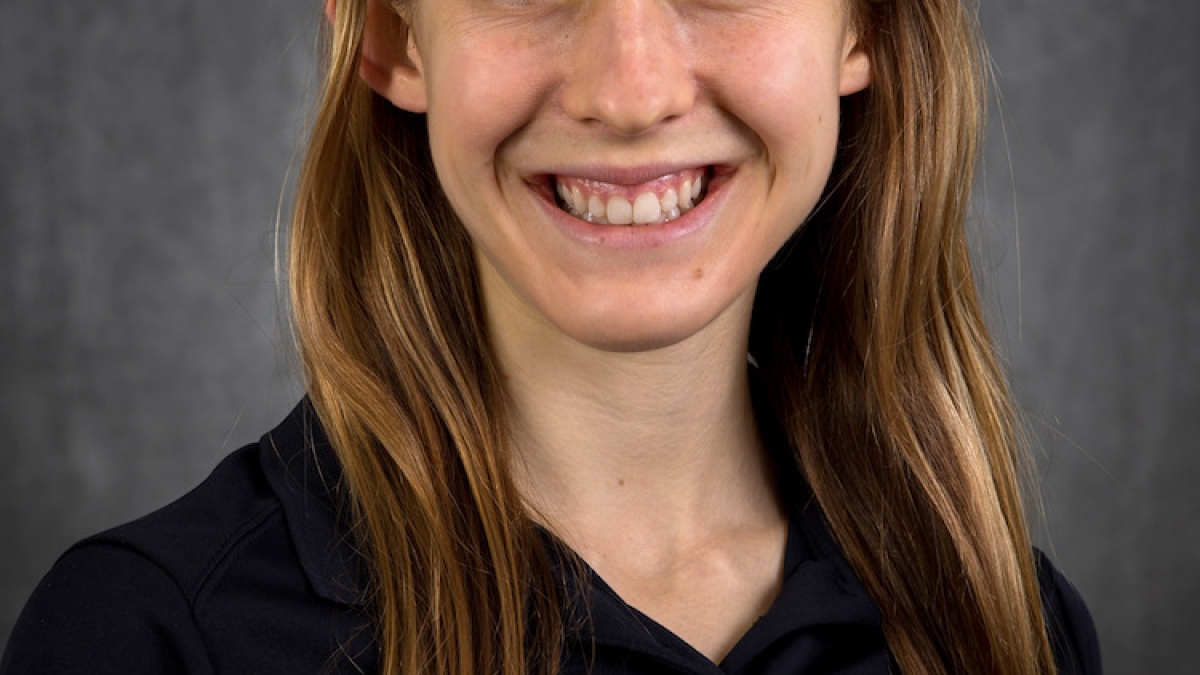NSF Graduate Research Fellow aims to improve lives with synthetic biology

Lexi Bounds
For recent Arizona State University biomedical engineering graduate Lexi Bounds, it was an enthusiasm for soccer that unexpectedly led her to find a new passion in the sciences.
“In high school I read a journal article that described a group of scientists who had ‘grown’ a soccer ball with pig bladder cells,” Bounds said. “Being a soccer player, I was more interested in being able to make my own soccer balls, but later thought that similar methods could potentially be used to engineer organs so that individuals in need would no longer have to wait for a match on the organ-donor list.”
Bounds, who was recently named a 2018 National Science Foundation Graduate Research Fellow, has always enjoyed learning how things work. Engineering provides the mathematical and scientific basis to explain these processes.
A family friend of the Chandler, Arizona, native — who happened to be a former faculty member in the Ira A. Fulton Schools of Engineering — convinced Bounds that ASU was the right place for her undergraduate education.
During her freshman year, Bounds played on the Sun Devil women’s soccer team. In her sophomore year, she gained an interest in scientific research and started working in the lab of biomedical engineering Assistant Professor David Brafman.
“Dr. Brafman introduced me to the concept of in vitro disease modeling and my research interests have focused on that field since,” Bounds said.
Bounds continued her work in Brafman’s lab as part of the Fulton Undergraduate Research Initiative during the fall semester of her junior year. She worked to find new approaches to understand how Alzheimer’s disease starts so that researchers can better treat it.
“In vitro disease modeling allows disease pathology to be studied in a more simplified and accessible manner,” Bounds said. “It allows for high-throughput screening so that effective therapies can be identified. More broadly, it provides a tool to study basic cellular processes as well and improve our fundamental understanding of the human body. I hope to make a meaningful contribution to the field, whether that is through developing new technologies or making novel discoveries.”
It was Bounds’ research that led to her being selected as one of this year's 2,000 NSF Graduate Research Fellows.
The National Science Foundation Graduate Research Fellowship Program supports outstanding students considered to be potential leaders in science, technology, engineering and math. These students are contributing to the high-impact research, teaching and innovation needed to maintain the nation’s technological strength, security and economic vitality.
“Put simply, it is amazing to be recognized and the fellowship brings a sense of validation that all the hard work throughout my undergraduate education paid off,” Bounds said. “Having a committee that has never met me recognize that they see my potential to pursue an academic career further cements my future career goals and gives me more confidence in pursuing them.”
Bounds, who graduated from Barrett, The Honors College, will continue her research at Duke University where she will study biomedical engineering with a focus on synthetic and systems biology, tissue engineering and regenerative medicine.
“My long-range career goals are to eventually earn a faculty position and lead my own lab,” Bounds said. “I also plan to stay involved with education outreach and mentoring.”
Bounds credits her experiences in the Fulton Schools to getting to this point of her academic career.
“The opportunity to be involved in undergraduate research through FURI and the mentorship of Dr. Brafman shaped the scientist and individual I am today,” she said. “The Fulton Schools taught me how to learn and how to process new information quickly.”
In addition to the scientific skills Bounds gained as an undergraduate researcher, she said she cannot understate the value of the rich research community at ASU.
“The fellowship also represents the tremendous support and mentoring I have received from other undergraduate and graduate students in my lab and other labs, as well as from Dr. Brafman.”
More about the 2018 NSF Graduate Fellow from the Fulton Schools of Engineering:
Logan Mathesen engineering solutions to big data challenges
Brendon Colbert combats cancer with math
Alisha Menon sets her mind to research brain-inspired computing
Scott Freitas wants to use computer science to solve society's toughest problems
More Science and technology

ASU professor wins NIH Director’s New Innovator Award for research linking gene function to brain structure
Life experiences alter us in many ways, including how we act and our mental and physical health. What we go through can even…

ASU postdoctoral researcher leads initiative to support graduate student mental health
Olivia Davis had firsthand experience with anxiety and OCD before she entered grad school. Then, during the pandemic and as a…

ASU graduate student researching interplay between family dynamics, ADHD
The symptoms of attention deficit hyperactivity disorder (ADHD) — which include daydreaming, making careless mistakes or taking…